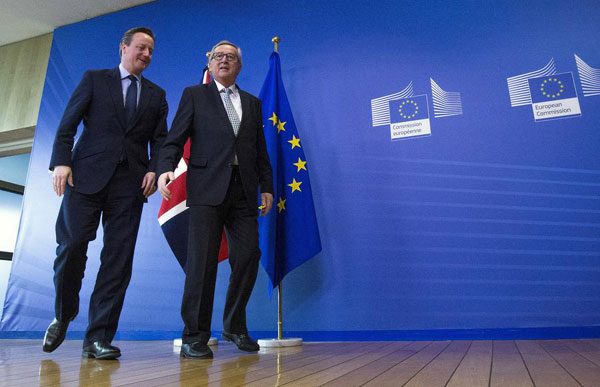Cameron defends EU deal as lawmakers offer no guarantees
Updated: 2016-02-17 10:42
(Agencies)
|
|||||||||||
 |
|
Britain's Prime Minister David Cameron (L) is welcomed by European Commission President Jean-Claude Juncker (R) ahead of a meeting at the EU Commission headquarters in Brussels, Belgium February 16, 2016. [Photo/Agencies] |
BRUSSELS - David Cameron fended off changes on Tuesday to a draft deal he has cut to help keep Britain in the EU, as other states demanded adjustments and the European Parliament said it could not guarantee to pass the reforms.
After talks on Monday with President Francois Hollande, who argued the draft text may give British banks unfair advantages, the British prime minister visited Brussels to meet EU executive chief Jean-Claude Juncker and leaders of the EU legislature.
Two days before a summit where all sides hope for agreement, wrangling continued behind the scenes over the wording of the deal. Cameron made no public comment during his stay in Brussels and one person who met him said he appeared "very stressed".
But Manfred Weber, the parliamentary centre-right leader and an ally of German Chancellor Angela Merkel, said he seemed "strongly convinced that he can convince the people" to maintain EU membership in a referendum EU officials expect Cameron to call soon after the summit, probably scheduled for June.
Summit chairman Donald Tusk, who presented a plan two weeks ago to help Cameron campaign on the basis the EU was adapting to British tastes, said after he met the Czech prime minister in Prague that leaders would have to go "an extra mile".
Bohuslav Sobotka said poorer states feared that not just Britain might use new rights to cut benefits for migrant workers from the east of the bloc.
Unhelpfully for Cameron as he faces scorn from eurosceptic opponents who say his deal is unlikely to survive a necessary passage through the European Parliament, the assembly's president said he could not guarantee to deliver new laws on benefits and migration after Britons have voted.
"This is not possible in a democracy," Martin Schulz said -- though he also said parliament had "no veto" over the accord and he, Weber and other leaders of major parties said they would legislate within the "framework" of the deal.
Cameron insists any agreement will be legally binding, even if it does not change EU treaties but takes the form of a treaty among the 28 EU states on how to interpret existing rules.
His office issued a statement saying party leaders he met supported the proposals and assured the prime minister they were ready to pass the necessary legislation after the referendum.
Related Stories
Tusk to publish proposal for UK-EU settlement 2016-02-02 09:22
UK, EU to see massive spending cuts 2010-10-21 08:00
Today's Top News
Turkey's Erdogan says to fight forces behind Ankara bombing
Aston Martin to develop electric car with China's LeEco
Huawei bids to become 'Internet of Things' platform
Britain's Cameron defends EU deal
Sichuan opera proves a hit with UK audiences
WeChat to charge fees for digital wallet transfers
Stocks fall in China after holiday week
Putin, Obama discuss Syrian crisis over phone
Hot Topics
Lunar probe , China growth forecasts, Emission rules get tougher, China seen through 'colored lens', International board,
Editor's Picks

|

|

|

|

|

|






